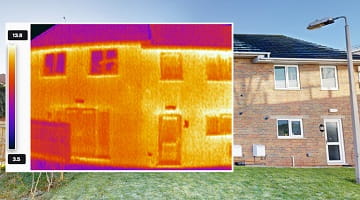Course modules
What you will study on this degree
Further guidance on modules
Modules are designated core or optional in accordance with professional body requirements, as applicable, and LJMU’s Academic Framework Regulations. Whilst you are required to study core modules, optional modules provide you with an element of choice. Their availability may vary and will be subject to meeting minimum student numbers.
Where changes to modules are necessary these will be communicated as appropriate.
Core modules
Engineering Maths for Engineers
15 credits
15 credits
Learning Skills
15 credits
15 credits
Civil Engineering Construction Technology
15 credits
15 credits
Engineering Mechanics and Strength of Materials
15 credits
15 credits
Site Surveying
15 credits
15 credits
Management and Health - Safety Practice in Construction
15 credits
15 credits
Geology and Soil Mechanics
15 credits
15 credits
Computer Aided Design for Civil Engineering
15 credits
15 credits
Engineering Mathematics
20 credits
20 credits
This module aims to develop your knowledge and understanding of the mathematics underpinning engineering, and helps you to apply these techniques within an engineering context.
Civil Engineering Technology
10 credits
10 credits
This module aims to introduce modern civil engineering, construction technology, forms of civil engineering structures and demonstrate understanding of methods and techniques used to create civil engineering structures and to develop the skills needed to solve problems associated with civil engineering activities. This module focuses on a wide range of civil engineering structures such as roads, tunnels, bridges, hydraulic structures and maritime designs. This module has a strong theoretical underpinning and learners will develop an understanding of the technical requirements for the construction of substructures and superstructures. It will help develop your self-awareness skills and introduce you to CPD and personal development planning. It introduces infrastructure and explains the interlinking between the various forms of infrastructure improvement for zero carbon world and comply with the UNSDG’s.
Geotechnics
20 credits
20 credits
This module will help you gain a basic understanding of soil and rock mechanics and their engineering applications.
Civil Engineering Materials
20 credits
20 credits
This module will provide an introduction to different civil engineering materials in terms of their source and properties. It will also help to provide understanding of the mechanics of materials behaviour. This includes exploring the relationship between stresses and strains and hence provide a sound rationale for the selection and use of materials in civil engineering.
Structural Analysis and Design
20 credits
20 credits
This module introduces structural mechanics and will help to provide an understanding of the basic concepts and techniques, with emphasis on the application of these to the solution of statically determinate structures. This module aims to apply mathematical and geometrical calculations to the determination of structural properties of sections. You will also learn to design and detail simple structural elements in compliance with current codes of practice and standards with due consideration for sustainability.
Site Surveying and CAD
20 credits
20 credits
This module will provide an introduction to basic techniques for land surveying and setting out. It includes methods of obtaining field measurements for the purpose of producing site drawings, and setting out points using line-of sight. It will also help to develop an understanding of the use and application of Computer Aided Design in the Built Environment and the development of 2-dimensional drafting techniques and conventions
Fluid Mechanics and Hydraulics
10 credits
10 credits
This module will introduce fundamental fluid properties and then consolidate your knowledge to the concepts, theory and application of fluid mechanics and establish their relevance in civil engineering. It will also help to demonstrate and explore key hydraulic phenomena through experimentation and laboratory activities. You will also be introduced to key principles of the analysis of pipelines for fluid transport.
Core modules
Structural Analysis and Modelling
15 credits
15 credits
Fluid Mechanics and Hydraulics for Civil Engineering
15 credits
15 credits
Advanced Construction Technology
15 credits
15 credits
Advanced Mathematics
15 credits
15 credits
Civil Engineering Hydrology and Environmental Science
15 credits
15 credits
Civil Engineering Structural Design
15 credits
15 credits
Multidisciplinary Project
15 credits
15 credits
Individual Student Project
15 credits
15 credits
Advanced Engineering Mathematics
10 credits
10 credits
This module will help develop student's knowledge and understanding of the probability theory and statistics underpinning engineering, and will demonstrate how to apply these techniques within an engineering context. It will further develop knowledge and understanding of relevant mathematical techniques underpinning engineering, and how to apply these within an engineering context.
Surveying and Transportation
20 credits
20 credits
This module will introduce you to the methods of infrastructure route planning, highway geometry, design & construction, geodetic and satellite surveying. It will help you demonstrate how total stations and GNSS receivers can capture data for use in software packages to produce contoured plans and sections. You will also develop practical surveying skills.
Advanced Geotechnics
10 credits
10 credits
This module will help you gain an advanced understanding of soil behaviour in shear, consolidation, induced and you will learn how to apply this to the design of earth structures.
Water and Environmental Engineering
20 credits
20 credits
This module will introduce and then consolidate your knowledge of the fundamental principles of engineering hydrology applied to civil engineering problems. It will provide you with an understanding of some of the key environmental and social problems with which you must deal within the context of global change and sustainable engineering. It will also present open channel flow concepts and provide you with the ability to perform and assess a range of hydraulic computations relating to open channel flow commonly used in civil engineering.
Advanced Structural Analysis and Design
20 credits
20 credits
This module will provide with an introduction to the analysis of statically indeterminate structures and the analysis of the plastic behaviour of steel structures. It will enable you to design and detail structural elements in reinforced concrete and structural steelwork using Eurocode 2 and 3. You will also be introduced to the use of software for the analysis and design of structures.
Multidisciplinary Project
20 credits
20 credits
In this module you will develop skills necessary to deliver a complex, group research project that fits within a sustainable civil engineering context. This module will enable you to develop the academic and digital literacy skills necessary to perform effectively in a Higher Education context. It will enhance your understanding of the professional subject area, and your skills in team work in a collaborative environment using industry standard collaborative CAD and design tools. It will also develop your understanding of Risk Management, Health and Safety and sustainability.
Individual Student Project
20 credits
20 credits
Students will be supported in their learning, to achieve the above learning outcomes, in the following ways: By a series of lectures and through participation within supervised research project.
A recommended resource list - indicating key reading, internet support and physical learning assistance, is provided to help enable students to undertake self-directed study.
Fees and funding
Entry requirements
Please choose your qualifications below to view requirements
Grades/points required from qualifications:
Work out how many UCAS points your qualifications are worth using the UCAS Tariff Calculator.
Qualification requirements
Alternative qualifications considered
English language proficiency Grade C or above in GCSE Ordinary Level.
OR
IELTS 6.0 overall with no component below 5.5, taken within two years of the course start date
OR
ICBT Higher Diploma in English
International requirements
Other international requirements
The HD suite of programmes at ICBT provides an excellent example of widening participation in a country where there is not enough University supply to fill the demand for higher education. Students can enter the HD programmes after studying for 13 years in the formal education sector through either having studied for A levels, or having undertaken the Foundation programme after studying for O levels. Other level 3 qualifications will also be considered for suitability for entry to the programmes. For the engineering programmes, students must have studied maths, biosciences and/or technology whereas for Quantity Surveying, any subjects will suffice. Students have been entering these programmes with these qualifications for many years and have been successful in achieving the qualifications.
How to apply
Securing your place at LJMU
Your university life
From accommodation and academic support to clubs and societies. Find out what LJMU has to offer.
Talk to our students
Connect with a current LJMU student for advice and guidance on university life, courses and more.
See what our students are saying
At LJMU we want you to know you're making the right choice by studying with us. You can see what our students are saying about their experience with us through their reviews on the following websites:
Related Links
News and views
Browse through the latest news and stories from the university









The university reserves the right to withdraw or make alterations to a course and facilities if necessary; this may be because such changes are deemed to be beneficial to students, are minor in nature and unlikely to impact negatively upon students or become necessary due to circumstances beyond the control of the university. Where this does happen, the university operates a policy of consultation, advice and support to all enrolled students affected by the proposed change to their course or module.
Further information on the terms and conditions of any offer made, our admissions policy and the complaints and appeals process.









